Reporting from Recife, Pernambuco / Brazil
Nilto Tatto, a member of the Workers’ Party (PT), is a Federal Deputy for the state of São Paulo, and current coordinador of the Commission for the Environment and Sustainable Development of the Chamber of Deputies of the Brazilian Congress. In this exclusive interview for United World International, he talks about the current situation of native peoples in Brazil, what were the political policies that were implemented to protect -or not- to these populations, in both Bolsonaro and Lula´s governments.
What is the situation of native peoples in Brazil?
First, it is important to understand how the relationship of the Brazilian elite was, historically, with the original peoples, the Brazilian indigenous peoples. Some research states that in Brazil, at the time the Portuguese arrived here, there were about 3 to 6 million individuals. And the Brazilian elite has always worked towards the elimination, the extinction of these peoples.
Indigenious people were at the edge pof extinction
This happened in such a way that, 50, 60 years ago, the indigenous population reached close to 250 thousand, to give indication how the number of individuals has been declining.
But there, in particular, during the 1988 constituent process, which configured fundamental rights for indigenous peoples in the current Constitution, the constituents, at the request of the Brazilian people, understood that it was necessary to build a country that included indigenous peoples within the Brazilian nation, as part of Brazilian society, as part of the nation, recognizing the importance of this cultural ethnic diversity. And, after this process, progress began in Brazil in what is fundamental for the existence of these peoples, which is the recognition, the demarcation of their territories as property of the Federal Union, but for exclusive use by indigenous peoples.
From then on, then, this population began to grow again in such a way that today in Brazil, the indigenous population grows faster than the average growth of the Brazilian population. We have approximately one million indigenous people in Brazil today.
Has President Lula’s government helped in this new situation?
Yes, in particular, during President Lula’s government progress was made towards the recognition and demarcation of indigenous lands. The same goes for emblematic territories. I will cite an example here, which is the Raposa Serra do Sol indigenous land, in the extreme north of the country, right on the border with Venezuela, where the indigenous movement had been fighting for a long time for demarcation and recognition. Landowners were invading land, a good part of their territory. President Lula then had the courage to demarcate it and give it back to the indigenous peoples.
There are several peoples that make up the Raposa Serra do Sol indigenous land and today manage to have peace and the prospect of survival. This period of recognition of rights, with another set of other public policies implemented by the government of President Lula and later continued in the government of President Dilma Rousseff.
I’m talking here in the area of health, in the area of education, in the area of supporting income generation projects for these indigenous communities, depending on the degree of contact with the surrounding society. So, a set of public policies made important leaders of the indigenous movement appear.
Lula’s policies changed the appearance of the indigenous movement
In what sense? How are they?
The picture of the indigenous movement has changed since the public policies implemented by the Lula government, way back. So, the indigenous began to have access, for example, to education, to the university, to the process of training indigenous teachers, even bilingual. And that made the indigenous movement itself grow.
It was during President Lula’s and President Dilma’s governments that the main political moment of the indigenous movement, the Terra Livre encampment, began to take place. And the new indigenous leaders, women in particular, but also youth organized a good part of this camp, the indigenous youth.
And today we have an organized movement with international repercussions, international recognition, recognition now by President Lula’s government, which as a result of this historic struggle and which, with the support of President Lula, the previous government, President Dilma, had a valorization of this movement and recognition of the specific expression, from the point of view of the identity of these population groups, which perhaps brings today as the greatest victory of the indigenous movement and the greatest recognition, we can say, of the Brazilian people in relation to the indigenous peoples, which is the fact of having created a specific ministry to deal with public policy for the indigenous population.
So today, Brazil has the Ministry of Indigenous Peoples, headed by a minister, Sônia Guajajara, who is one of the leaders who were created in this most recent process and who assumes the role of Minister of State. And it has at its head the main institution to carry out and implement public policies for the indigenous people, which is the National Indian Foundation, FUNAI, it has at its head, for the first time in the history of the country, also an indigenous leadership, which is to Joênia Wapichana, who was once a federal deputy, the first indigenous woman federal deputy, and who now assumes this important role. So, this as a result, especially, in the last, we can say, of the indigenous struggle of the last 30, 40 years, but which gained intensity in the governments of President Lula and President Dilma.
Can you talk a little more in detail about what were the policies in terms of the environment and indigenous affairs in Lula´s governments?
That implemented the rights of indigenous peoples that are guaranteed in the Constitution itself. Right to education, in specific programs of differentiated education, training of bilingual indigenous teachers to learn the language, write the language and also Portuguese. It was the president who structured the differentiated health policy for indigenous peoples, and also who has most demarcated indigenous lands, including many of the very difficult cases that were in conflict with ranchers who had invaded indigenous lands. So, this resulted in an increase in the indigenous population itself and the political expression of the indigenous movement. So, during President Lula’s period, specifically for the indigenous population, he implemented what in fact is stated in the Brazilian Constitution itself and that historically the Brazilian elite did not carry out because it works with a perspective of taking over indigenous territories.
Native people and deforestation
In the area of the environment, I would perhaps say that President Lula’s main action was to have reduced deforestation by 84%. And this is an important policy from the point of view of the challenges we face in facing the global climate crisis. Brazil has little responsibility for greenhouse gas emissions that cause global warming. Less than 5% of emissions are Brazil’s responsibility, but 70% of the emissions that the country produces are related to land use, the model of agriculture and deforestation. So, when President Lula’s government reduces deforestation by 84%, this results in Brazil becoming the country that has most contributed to the reduction of greenhouse emissions.
How was the situation during the Bolsonaro government?
We have had a very big setback since the coup that was perpetrated against President Dilma. Many of the public policies for social inclusion, recognition for indigenous peoples and traditional communities in Brazil, quilombolas, fishermen, etc. they were interrupted in the Temer government and then we had, during the Bolsonaro government, an anti-indigenous peoples, anti-quilombola, anti-traditional communities policy. So it wasn’t just an interruption, but rather, encouraged by the Bolsonaro government itself, the invasions on indigenous lands, on quilombola territories, the invasions on extractive reserves and with consequences from the point of view of threat to the very lives of peoples and traditional communities in Brazil, interrupting a virtuous cycle that had started way back with the government of President Lula and President Dilma, interrupting a virtuous cycle of incorporating this ethnic and cultural diversity as part of the Brazilian nation, as part of the Brazilian people.
The consequences we had, for example, paralyzed the demarcation of indigenous lands. The government encouraged the invasion of loggers to steal wood, encouraged the invasion of miners who bring death into indigenous territories, environmental contamination, mercury contamination, deforestation. We had an increase in deforestation again, especially in the Amazon, but not only in the Amazon, but also in the Cerrado, in the Atlantic Forest.
All this as an action, an action by the Bolsonaro government. An action that went in the opposite direction to what the Brazilian people even claim to recognize this ethnic and cultural diversity. What the Brazilian people and the international community itself demand from Brazil to take care of the environment, to take care of the forest, especially the Amazon forest, which plays an important role in the debate on the climate crisis.
So, we had an increase in fires, an increase in deforestation, an increase in violence in the countryside, especially the violence perpetrated by jagunços at the service of landowners, agribusiness, who threaten and even murder leaders in this socio-environmental field. So, we had a very difficult time, with a lot of setbacks during the Bolsonaro government, with consequences for the environmental agenda, with consequences for Brazilian ethnic and cultural diversity.
And with Lula’s return in last October 2022?
From the point of view of public policy: I’m talking about indigenous peoples, traditional communities, quilombolas, peasants in general, family farming, workers on the outskirts of cities. This population, historically, is on the margins of the construction process of the Brazilian nation.
With the absence of universal public policies, such as education, health, good food, in short, support for their economic activities, the recognition of spaces that is fundamental for the survival of this population. I’m talking about the struggle for land and territories, agrarian reform for those who live in the countryside, for those who live in the forest. I’m also talking about the fight for housing for those in urban centers, the sanitation policy for this population.
With Lula’s election in 2002, Lula began to implement a very large set of policies that looked at those who were marginalized throughout the country’s history. And with that, this population saw how important it is to have a popular government, a government that looks at the Brazilian population as a whole, especially those who have always been historically marginalized. Then comes the coup that removes President Dilma, who was continuing the policies implemented by President Lula, and then interrupts the set of public policies that included people, that improved the quality of life, that gave prospects for the future of their children, your grandchildren, for future generations. Just so we have a parameter here. Brazil, in 100 years of federal university, had already paralyzed about 2 million people for many years.
500,000 places at the university. With President Lula’s government, it jumped to almost 8 million vacancies in universities. So, this is a process of inclusion. Including the poorest, urban workers, peasants, quilombola and indigenous youth.
So, it messed with the structure of historical and racist inequality in Brazil. Bolsonaro carried out the coup, interrupted these policies. Then, evidently, the people felt that they needed to have President Lula back and they had the opportunity now, in the 2022 elections. victory.
Why was President Lula victorious? Because they wanted back all those public policies that were previously implemented and that we are now witnessing, already at the beginning of the government, the resumption of all those public policies that made a difference in all of Brazilian society, especially for the poorest, those that gave President Lula victory now in the 2022 elections. And we are seeing this, the difference. So, several programs have already been launched, food purchase programs, the construction of the Ministry of Indigenous Peoples itself, the resumption of the demarcation of indigenous lands, quilombola territories, policies to support family farming.
Lula resumed policy of public housing construction
Lula resumed the Minha Casa Minha Vida policy of building housing for those who need it most. He resumed the Bolsa Familia policy that 30 of the 3 million people needed to return to the hunger map, which Brazil had ended, had eliminated hunger in Brazil during the government of President Lula and President Dilma and returned after the coup of the Bolsonaro government, now the policies to face unemployment, face hunger, face the challenges of the environmental agenda return. There is something new in this now new administration of President Lula, which is an understanding that facing inequality and facing the climate crisis, the environmental agenda needs to be working together on the same level of concern. From an understanding that we need to work together, on the same level of concern.
We are not going to solve the problem of extreme poverty without solving the problem of the climate crisis because when we have major disasters due to climate change and we are witnessing an increase in prolonged droughts, an increase in storms, it is the poorest who suffer more with the consequences, with the disasters caused by climate change.


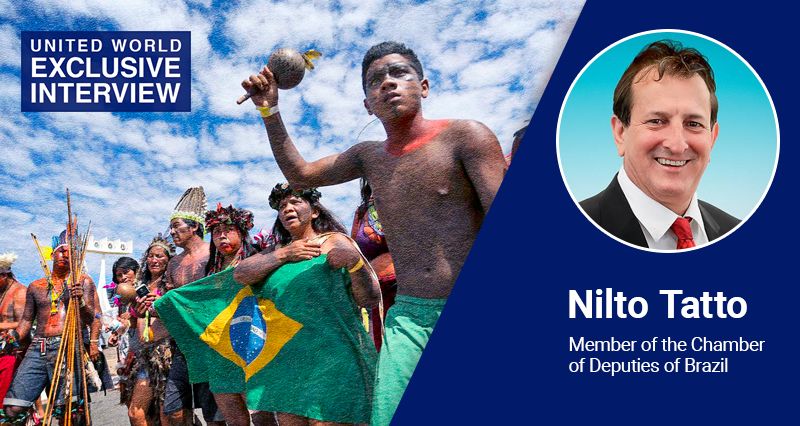
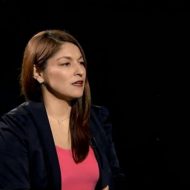
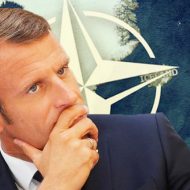
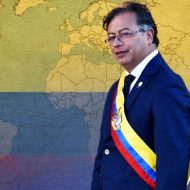
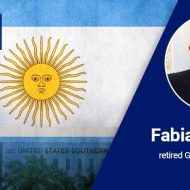

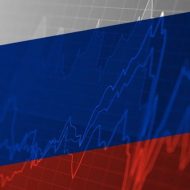
Leave a Reply